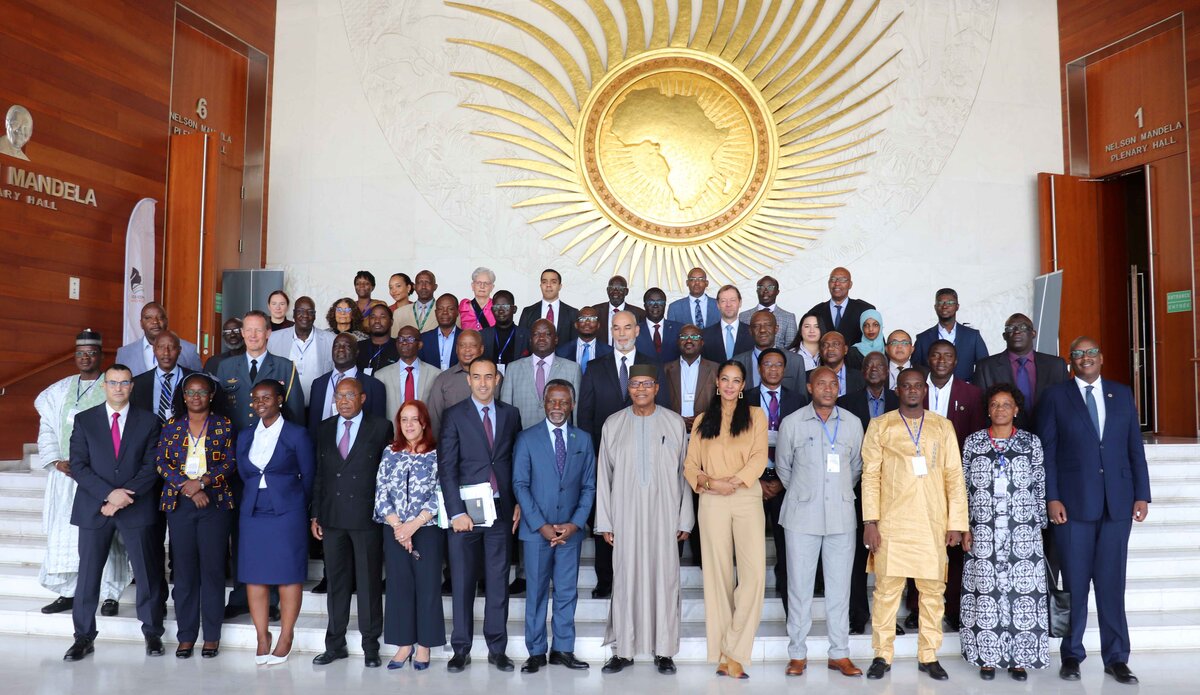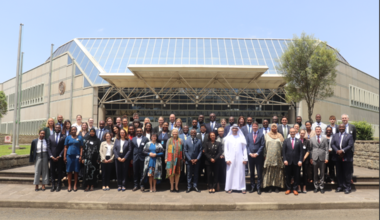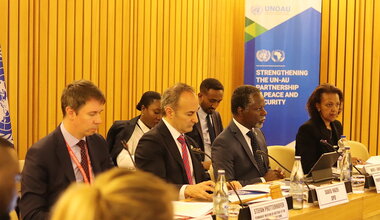UNOAU Supports the African Union Security Sector Reform (SSR) Policy Framework 10th Anniversary Commemoration| 21- 22 November 2023
Security Sector Reforms and Governance remains a vital element of the African Peace and Security Architecture (APSA), and is recognized as an essential precondition for good governance, conflict prevention, post-conflict reconstruction and peace-building. Security sector reforms and repurposing of security institutions and agencies is also a critical enabler of the efforts required to Silencing the Guns in Africa, to create the peaceful and secure Africa, envisioned in Aspiration 4 of the Agenda 2063.
Against this backdrop, the AUC Department of Political Affairs, Peace and Security (PAPS), in collaboration with UN office to the African Union (UNOAU), the African Security Sector Network (ASSN)/ Just Future Alliance, the Institute for Security Studies/Training for Peace (ISS-TfP) and the African Policing Civilian Oversight Forum (APCOF) organized a conference on the African Union (AU) Security Sector Reform (SSR) Policy Framework: A Decade of Implementation. The aim of the conference is to provide an opportunity to all stakeholders to take stock of achievements, challenges and lessons learned in supporting AU Member States engaged in security Regimes and to map the way forward for the upcoming decade. The recommendations of the events will be submitted to the AU Peace and Security Council for consideration and guidance. PSC decisions will provide strategic guidance on the way forward to address identified challenges and improve accountability in security governance on the African continent.
In his opening remarks, H.E. Dr. Mohamed Ibn Chambas, the African Union High Representative for Silencing the Guns on behalf of H.E Ambassador Bankole Adeoye, Commissioner for Political Affairs, Peace and Security noted that since the adoption of the AU Policy Framework on Security Sector Reform by the AU Assembly in January 2013, the AU Commission has been working persistently to promote and support its implementation. The work of the Commission has centered on three pillars: providing direct assistance to Member States embarking on security reform processes; production of knowledge tools and building human capacities; and facilitating coordination and dialogue among regional and international actors providing SSR support in Africa. “On requests, the Commission has also provided SSR support to Member States in political transitions and in Post Conflict contexts, including Central African Republic, Ethiopia, Guinea Bissau, the Gambia, Lesotho, Madagascar, Mali, South Sudan and Somalia. The support ranges from designing, implementation and coordination of nationally led SSR processes. All support considered the important role of women in security governance and sustaining peace. In this context, the Commission has developed an Operational Guidance Note (OGN) on Gender and Security Sector Reform, and rolled out its dissemination to Member States and RECs in 2019. Related training curricula are being developed, to facilitate Member States to use this tool. In addition, other OGNs have been developed to increase knowledge, awareness and enhance capacities on different thematic areas, including :1) Training on Security Sector Reform; 2) Conducting Security Sector Reform Needs Assessment Missions; 3) Harmonization of National Security Legislation; 4) Development of Codes of Conduct for African Security Institutions; 5) Handbook on African Security Sector Reform Good Practices; and 6) Security Sector Reform Monitoring and Evaluation,” said Dr. Mohamed Ibn Chambas.
Dr. Mohamed Ibn Chambas further noted that the AU Master Roadmap of Practical Steps to Silence the Guns in Africa by the Year 2030 placed emphasis on security governance. “It acknowledges that the limited progress in transforming African defense and security forces into professional and disciplined national security institutions, that are subject to accountable nationional government oversight and control, has often led to eruption of, or relapse into conflicts. This inevitably leads to cyclical conflicts and violence, disrupting stabilization and peace-building efforts,” said the African Union High Representative for Silencing the Guns.
H.E. Parfait Onanga-Anyanga, Special Representative of the Secretary General (SRSG) and Head of the United Nations Office to the African Union noted during his opening remarks that Security Sector Governance and Reform (SSGR) should be a key element of the political processes of states emerging from conflict and to strengthen the rule of law institutions. It is essential to address SSGR early on as it plays a key role in different phases of the conflict cycle, including peacebuilding but also related to conflict prevention as well as the stabilization and reconstruction afterwards. SSGR needs to be part of a comprehensive approach and larger peacebuilding and development strategies. The SRSG highlighted three key principles: Trust – the cornerstone of the security system. Robust security institutions hinge on integrity, accountability, and transparency; National ownership – this entails national responsibility and commitment; and Inclusivity – attention should be given to the security and justice needs of all people. A people-centered approach to Security Sector Governance and Reform is crucial for sustaining peace. The SRSG mentioned that the conference offers a chance to critically reflect on the implementation of SSGR on the African continent and to share experiences. “The United Nations looks forward to continuing the partnership and to work together towards sustainable peace in Africa by strengthening Security Sector Governance and Reform efforts,” concluded H.E. Parfait Onanga-Anyanga.
Dr. Niagale Bagayoko on behalf of ASSN/Just Future, as ASSN Chair, said that ASSN has worked with the AU over a decade as an implementing partner to promote the policy framework on SSRG. She echoed that the AU Policy Framework on SSR has not received the support required for full dissemination on the continent. She noted that ensuring inclusive security presents a challenge in Africa due to the complexity of the security environment. “After a decade of adoption, it is important to brainstorm on more creative implementation strategies to achieve desired impact,” said Dr. Niagale Bagayoko . She concluded by reiterating the need to emphasize the bottom-up approach to ensure inclusive security for everybody’s benefit.
During the meeting, from 21-23 November 2023, participants had different sessions on understanding of the AU SSR Policy Framework and the challenges related to Security Sector Reform & Governance processes in the African context. The conference is specifically focussing on three elements related to the ten-year implementation of the AU SSR Policy Framework: a) looking back to the achievements, b) highlighting challenges and lessons learned, and c) looking forward to the next steps. In particular this last element is essential, as it focuses on identifying concrete steps to enhance the future implementation of the AU SSR Policy Framework.
Source: https://www.peaceau.org/en/article/press-release-the-african-union-au-se...
 UN
UN






